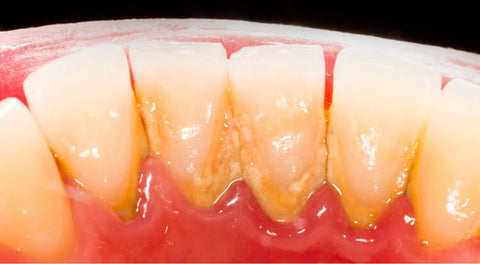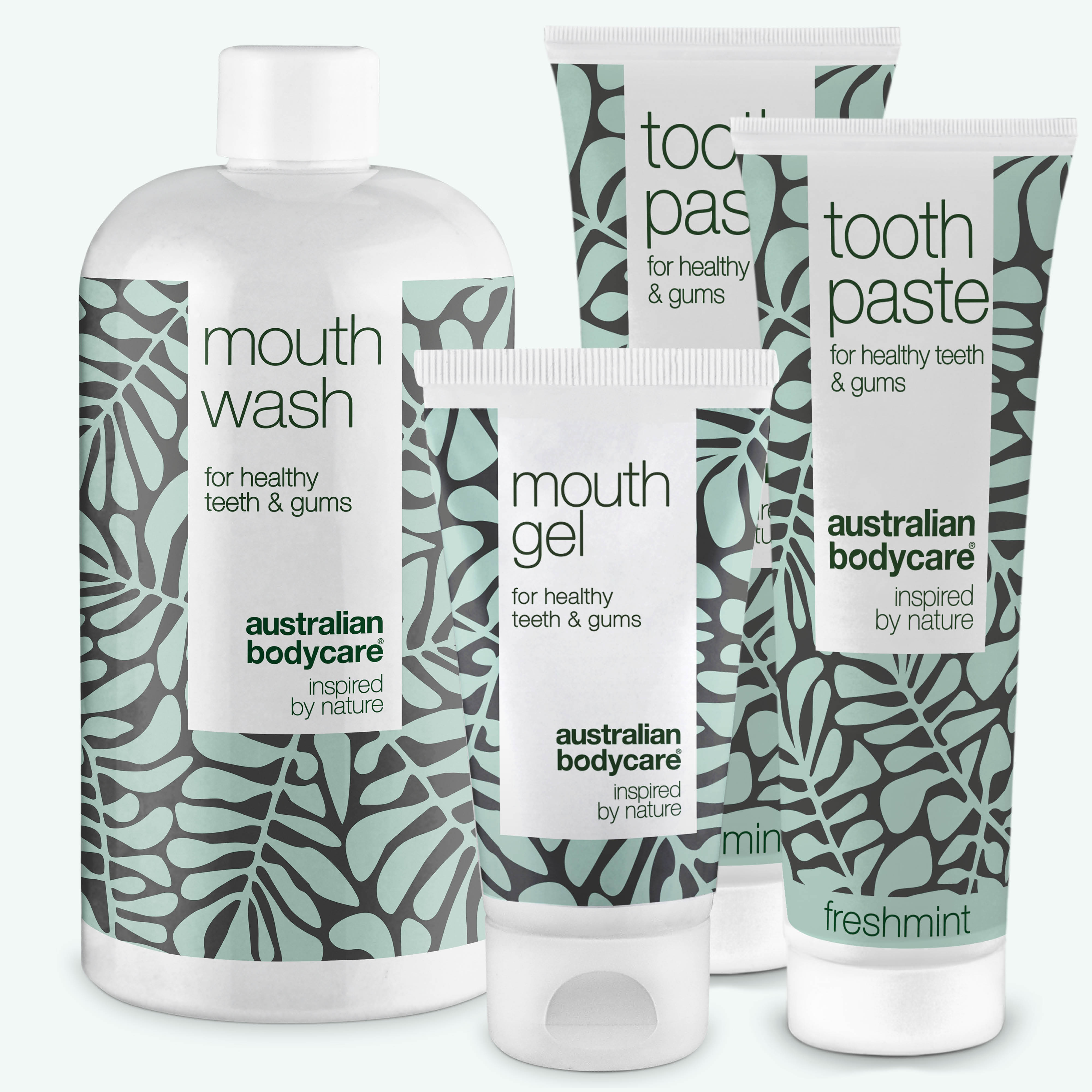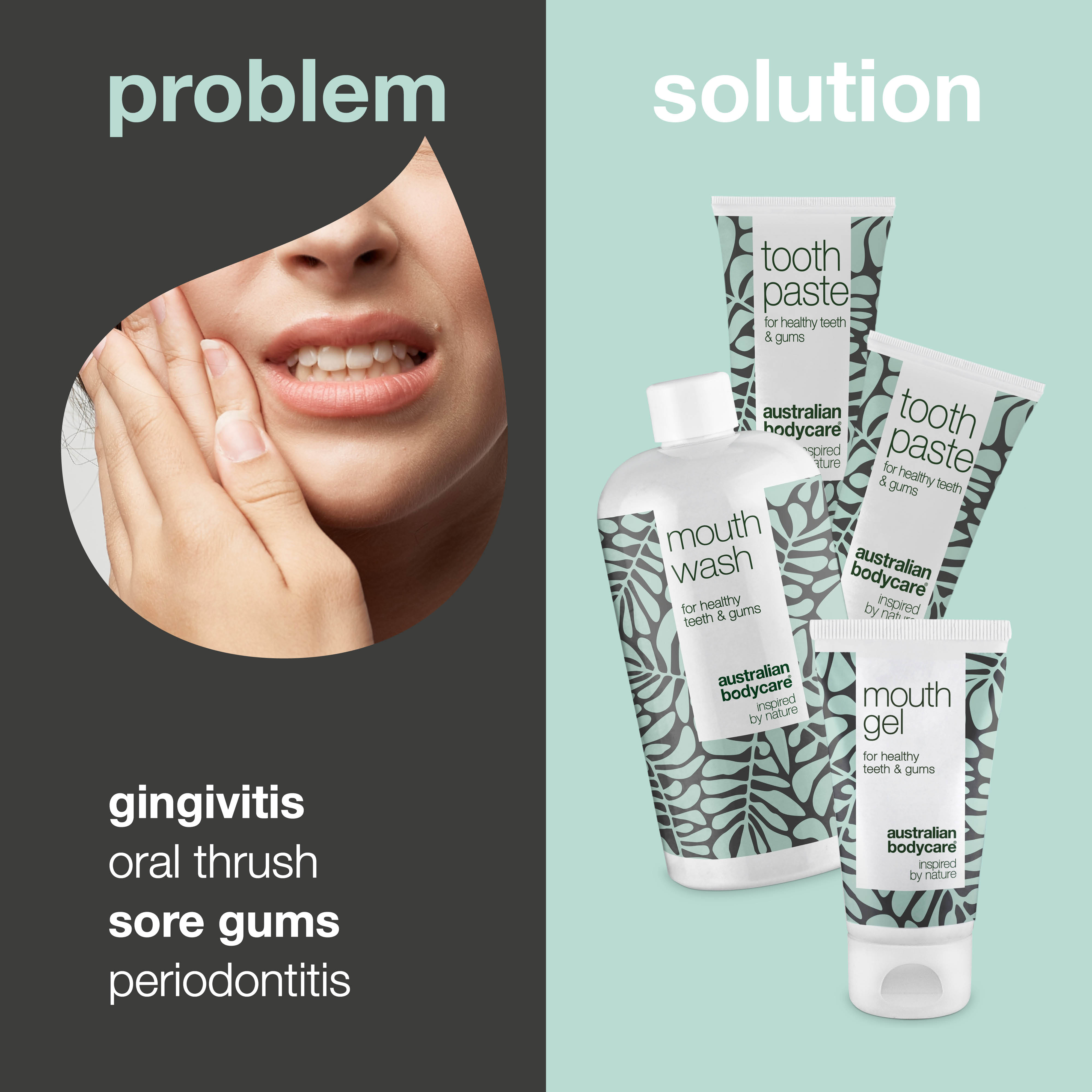Everything You Need to Know About Tartar on Teeth: Prevention, Treatment, and Handy Tips
Tartar is a common issue for many of us. It's those tough buildups that form when plaque on our teeth hardens. If left unchecked, it can lead to cavities, bad breath, and even periodontitis.
Preventing tartar isn't just about keeping a pretty smile—it’s crucial for avoiding permanent damage to your teeth. Our article is here to arm you with the tools and knowledge needed to tackle this head-on.
Keep reading to find out how.
Table of contents
What is tartar and how does it form?
Tartar forms when plaque on your teeth isn't effectively removed. The plaque hardens into tartar when minerals from your saliva mix with bacteria and food particles in your mouth.
This leads to a tough coating that can cause gum disease and other oral issues.
Defining Tartar
Tartar is the result of plaque on the teeth turning into hard deposits. These deposits are made up of calcium from the saliva which mineralizes the plaque. This process creates a firm surface that allows bacteria to thrive and cause gum issues.

Removing tartar requires a professional touch, as it’s not something easily done at home. After removal, dental professionals polish the teeth to lessen discoloration and smooth out the surface, making it harder for new plaque to stick.
This step is vital for maintaining dental health and preventing further tartar buildup.
Causes and Risk Factors
Plaque forms on teeth due to bacteria. This layer can turn into tartar if not removed. Lack of good oral hygiene plays a huge role here.
Without regular brushing and flossing, plaque is left to harden.
Smoking is also a major culprit in the risk of developing tartar and periodontal disease. The same goes for people’s diets and overall health. Salivary glands play a role in tartar formation, especially around their ducts.
Therefore, focusing on diet and quitting smoking are crucial parts of preventing tartar.
Signs of Tartar
Tartar often appears as yellowish or brownish hard coatings on the teeth. It can lead to bad breath and isn’t something you can simply brush away with regular toothbrushing.
The gums around affected teeth can also become red, swollen, and bleed, especially during brushing. These are signs of gum inflammation caused by tartar.
Loose teeth or a feeling that your teeth are becoming looser could also indicate advanced tartar. This issue can progress as tartar works its way below the gum line, affecting the structures that hold teeth in place.
Without professional treatment from a dentist or hygienist, these issues can lead to further oral health problems, including tooth loss.
Preventing Tartar
Good oral hygiene is essential to prevent tartar. Proper brushing techniques and regular use of floss and mouthwash can help remove plaque and reduce tartar formation.
Importance of Good Oral Hygiene
Good oral hygiene is crucial for maintaining healthy teeth and gums. Daily brushing and flossing help remove plaque and food particles, which can otherwise lead to tartar formation.
Regular dental visits also ensure that any tartar is professionally removed and reduce the risk of long-term dental problems.
A healthy mouth starts with good hygiene.
Proper Brushing Technique
When brushing your teeth, hold your brush at a 45-degree angle to your gums. Use small circular motions and brush gently over all tooth surfaces. Remember to brush the inner, outer, and chewing surfaces of your teeth.
Make sure to brush for at least two minutes each time, and use a soft toothbrush to avoid damaging the enamel.
Using Floss and Mouthwash
Using floss is essential for removing plaque and food particles between the teeth. Daily flossing can prevent tartar formation. Mouthwash with antibacterial properties can also help reduce the amount of bacteria in your mouth, further reducing the risk of tartar.
These simple steps are key to maintaining good oral hygiene and avoiding issues with tartar.
Treating Tartar
When tartar forms, professional dental cleaning is the most effective treatment. While some tartar can be removed at home, it's best to seek dental care for a thorough cleaning.
Read on to discover the best methods for effectively treating tartar.
Professional Dental Cleaning
Professional cleaning is performed by a dental hygienist or dentist using specialized tools and ultrasonic technology. During the procedure, tartar is removed from the tooth surface and around the gums to prevent gingvitis and periodontitis.
This type of cleaning can only be done in a clinic, so it's important to schedule regular dental check-ups to prevent tartar buildup and other oral issues.
The process of removing tartar is essential for maintaining good oral hygiene and protecting dental health.
Self-Treatment for Tartar Removal
Self-treatment to remove tartar can be an effective way to maintain good oral hygiene. At home, you can use special tartar removal tools, such as scrapers and interdental brushes.
These tools can be used to gently scrape the tooth surface to remove accumulated tartar.
It's important to be careful and follow instructions closely, as improper use of these tools can cause damage to the teeth and gums. Self-treatment methods can supplement regular dental visits and professional cleanings to keep tartar in check.
Dental Care for More Serious Cases
Sometimes, more severe cases of tartar require professional help. A dentist can perform a thorough cleaning to remove tartar and plaque that may have built up over time.
If the tartar has caused periodontitis, the dentist may recommend further treatments to address the inflammation and protect the teeth from further damage. It's crucial to seek professional dental care to manage more serious cases and prevent long-term oral health risks.
The Importance of Preventing Tartar
Preventing tartar is crucial for protecting the teeth from damage and improving oral hygiene. By adopting healthy oral care habits and regularly removing tartar, you can reduce the risk of gum disease and cavities.
A consistent effort to prevent tartar can improve overall dental health and minimize the need for more extensive dental treatments.
Protection Against Permanent Damage
Good oral hygiene is vital for protecting your teeth from permanent damage caused by tartar. Daily brushing with fluoride toothpaste, using floss and mouthwash, and regular dental visits can help prevent tartar and protect your teeth.
Tartar can lead to gum disease and periodontitis, which can cause permanent damage to your teeth and contribute to cavities. Additionally, extended dental cleanings may be necessary to remove deep tartar and protect your teeth from permanent damage.
To avoid permanent damage, it's important to maintain good oral hygiene to prevent the formation of tartar and protect your teeth from damage caused by tartar.
Improving Oral Hygiene and Preventing Gum Disease
Improving oral hygiene is crucial for preventing gum disease. Regular brushing, using floss and mouthwash, and visiting the dentist for cleanings help remove plaque and prevent the formation of tartar.
Good oral hygiene can also prevent bacterial accumulations, which can lead to gum inflammation and periodontitis. These simple steps can help maintain a healthy mouth and reduce the risk of gingvitis, such as gingivitis and cavities.
Conclusion
Preventing tartar is essential for maintaining good oral hygiene. Regular brushing and using floss are effective methods for removing plaque and preventing the formation of tartar.
Professional dental cleanings at the dentist can ensure thorough removal of any existing tartar. Avoiding smoking and ensuring adequate saliva production can also help reduce the risk of tartar.
With these preventative measures, you can maintain healthy teeth and avoid potential complications.
FAQ
What is tartar, and what does it look like?
Tartar, also known as calculus, is hardened plaque that adheres to the teeth. It can appear yellow or brownish and is often found between the teeth or along the gumline.
Can I remove tartar myself?
While some people attempt to remove tartar themselves, the Dental Association recommends having it professionally removed at a dental clinic to avoid damage to teeth and gums.
Why do people get tartar?
Tartar forms when plaque, which is a mix of bacteria and food residues, hardens on the teeth. If plaque isn't regularly removed through brushing and flossing, it can mineralize and turn into tartar.
What role does toothpaste play in preventing tartar?
Toothpaste designed to prevent tartar helps by reducing the amount of plaque and bacteria, the precursors to tartar, through regular use.
Is it possible for tartar to fall off naturally?
Tartar rarely falls off on its own. It often requires professional cleaning to remove it effectively without damaging the teeth.
How can I prevent and avoid tartar?
Regular oral hygiene, including proper brushing and the use of floss, along with regular visits to the dentist, can help prevent the formation of tartar. Limiting intake of foods that promote plaque formation and using a good-quality tartar-control toothpaste can also make a significant difference.
Why do I get so much tartar?
Some people produce more tartar than others due to individual differences in saliva composition, oral hygiene habits, and diet. A dry mouth or certain medications can also increase the risk of tartar formation.
How quickly does tartar form?
Tartar can begin to form as little as 24-72 hours after plaque has developed. It can take several days or weeks for the plaque to harden completely into tartar, depending on the individual's oral hygiene and other factors.
Sources:





